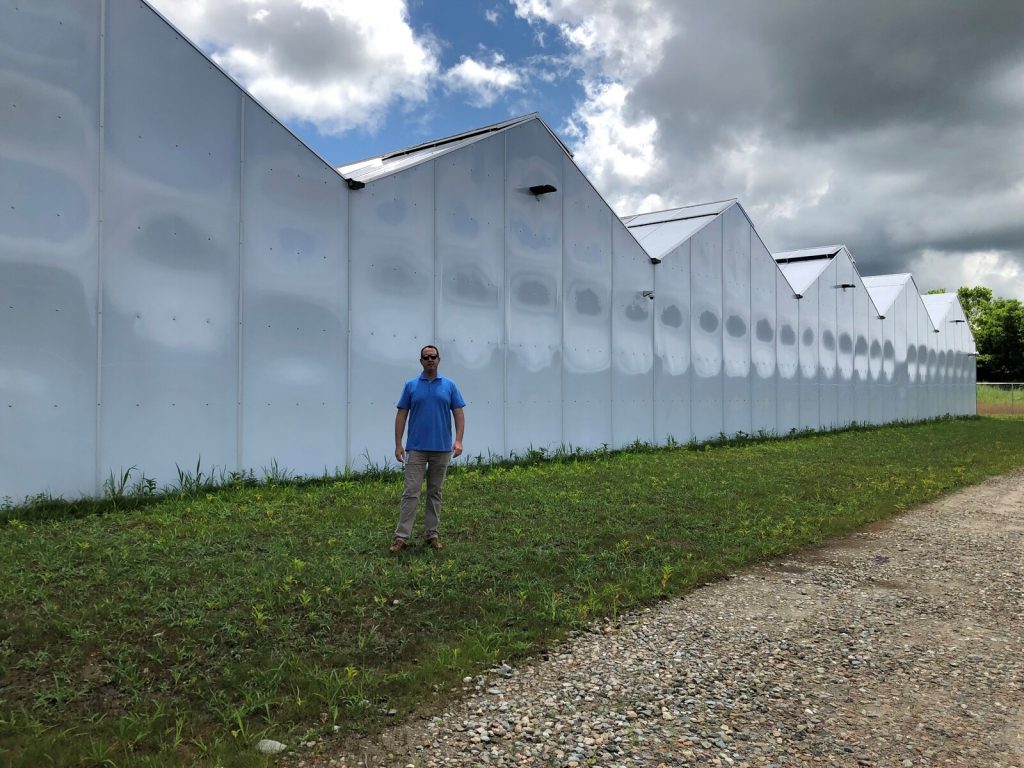A Conversation with Tim Keogh, CEO of AmeriCann
Cannabis is big. In 2019, with medicinal (and/or recreational) legalization in 33 states, revenue is projected at $11.2–$13.7 billion. With federal legalization inevitable, this sum is bound to grow; by 2023, revenue may push $30 billion. But what does “big cannabis” look like?
AmeriCann CEO Tim Keogh is one visionary betting on an explosion in demand. “In 2012, after the ballot initiatives passed in Massachusetts for medical and Colorado for adult use, the ‘industry’ seemed to me to be the opportunity of a lifetime,” Keogh said. “I had witnessed the benefits to patients first hand through my advocacy, and my background in development and operations gave me a unique perspective on what the industry needed to reach its full potential.”
Keogh spearheaded the recent opening of Building 1 at AmeriCann’s Massachusetts Cannabis Center (MCC) in Freetown, Massachusetts. The MCC sits on 52 acres and spans almost one million square feet. The goal of this massive facility is to house cultivation and processing infrastructure for licensed cannabis producers. Building 1 — which is currently contracted for occupancy solely by Bask, Inc. — is equipped to generate 7,500 pounds of dry flower and 400,000 infused products per year.
“AmeriCann develops cultivation, processing, and product manufacturing facilities, so we are involved in every aspect of the cannabis industry until distribution,” Keogh explained. “Our cultivation hub will support plants owned by various local growers.”
It’s a unique concept: a flexible workspace that caters to virtually any licensed cannabis producer. AmeriCann relies on a 15% revenue participation fee from products produced and sold at the MCC facilities.
The facility itself boasts specialized features designed to safeguard profits… and sustainability. It’s no secret that indoor cultivation is expensive and energy intensive; on the other hand, outdoor cultivation limits annual harvests. The MCC features a hybrid approach. “It uses greenhouse technology, meaning that the growing process involves captured natural sunlight,” Keogh said. “This decreases the amount of artificial lighting needed to grow the plants efficiently by 65%, and in turn, our utility bills are far less expensive than in typical warehouse cultivation facilities. We also use warming tables to keep the plants growing efficiently year-round.”
Other technologies include a targeted watering system and individual watering mechanisms to minimize waste. The canopy system purposes to maximize production and reduce carbon footprint. An automated ag-tech system is used to enhance efficiency with strategic horticultural design. Keogh also mentioned “workflow efficiency to protect the plants and minimize labor costs.”
“The state has strict regulations for energy usage in cannabis production, and we wanted to make sure we were surpassing these at every available turn,” he explained. Keeping production costs low is also (obviously) vital for profits.
Efficiency and sustainability are not the only talking points surrounding big cannabis. AmeriCann is a publicly traded company, which brings its own unique opportunities and challenges.
“We are held to a higher standard of financial reporting than private businesses,” Keogh admitted. “Our financials are audited annually and we file quarterly reports that are prepared by the auditors.” While this may sound like a headache, Keogh sees the bright side: “This creates transparency and accountability for our shareholders, regulators, and community partners where we operate.”
Furthermore, AmeriCann is naturally more inclusive in terms of investors compared to private companies. “An investor can purchase 1 or 100,000 shares and has the option to sell them in the same manner without the barriers found in private companies,” Keogh continued.
While the company currently emphasizes vertical integration for licensed partners, AmeriCann Brands glistens on the horizon. Building 2, once complete, will produce branded and white label consumer packaged goods. AmeriCann Brands will span edibles, dry flowers, and concentrates.
“We’d like to lead the sustainable cannabis movement, setting a new precedent for what is considered safe to consume, and pushing the market to raise their production standards.” Keogh believes that the strict regulations on cannabis in Massachusetts set up the East-coast company to become a multi-state operator (MSO) once cannabis becomes federally legalized.
“In terms of next steps, we are focused on profitability, which helps us identify where, when, and how we expand the company,” he said. “For us, it all starts in Massachusetts — the commencement of operations of the first phase on MCC and our applications and construction on the second building. From there, we will explore other States and market opportunities.”
But the industry is ripe with misconceptions. Keogh feels that the stigma surrounding cannabis remains the biggest obstacle for the eruption in demand that he envisions. In a way, AmeriCann’s mission revolves around ending this stigma and commodifying cannabis. “By showing the communities where we operate and develop that cannabis can be cultivated, processed and sold to patients and responsible adults in a secure, sustainable manner, we help change perceptions. It’s our way of contributing to the continued adoption of new regulations and markets across the United States.”
Of course, federal prohibition doesn’t help, either.
“The legalization and regulation of cannabis is the only way to effectively ensure that the products people are consuming are safe and clean,” Keogh said. “Passing legislation to allow individual states to legalize cannabis along with banking bills and related laws will go a long way to making this happen. There is so much opportunity that can arise from this industry, and the federal government would be prudent to recognize the nationwide health and financial benefits to ending cannabis prohibition.”
Keogh started as an advocate. At the end of the day, big cannabis is about meeting big needs. At least, it should be.
“As a natural pain reliever, it can replace addictive, hard-on-your-body drugs like opiates, meaning that, as a country, we will see fewer drug addicts and increased quality of living for those suffering from post-surgery ailments, PTSD, anxiety, and more,” Keogh concluded. “We know patients are benefiting from cannabis for pain management and other ailments, so we look forward to wider acceptance of these safe, important, and, now, legal products.”









